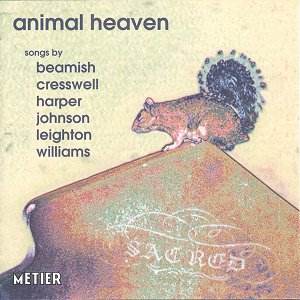 |
ANIMAL HEAVEN
Edward HARPER (b.1941): Lights Out (1993) Lyell CRESSWELL (b.1944): Prayer to appease the Spirit of the Land Kenneth LEIGHTON (1929 - 1988): Animal Heaven Op.83 (1980) Sally BEAMISH (b.1956): Four Findrinny Songs (1998) Roger WILLIAMS (b.1943): Oh! Mr Lear! (1998) David JOHNSON (b.1942): God, Man and the Animals (1988) Recorded: Reid Concert Hall, Edinburgh, September 1999 Crotchet AmazonUK AmazonUS Amazon recommendations |
Edward Harper's Lights Out was written in memory of Kenneth Leighton and sets four poems by Edward Thomas who was killed in action in 1917. The poems chosen by Harper reflect aspects of nature, although not necessarily nature's happiest facets, and the poet's "very personal response to the Great War". The first song The Trumpet opens - appropriately enough - with fanfares on the cello supported and echoed by drum-beating on the harpsichord. The vocal line also somewhat evokes bugle calls. The Ash Grove is "a little fantasy on that folk-tune" which is quoted at the end on the tenor recorder. This is a fairly straightforward, simple setting of great beauty - a slow resilient meditation. The Wind's Song opens in a reflective mood that later becomes more exalted, particularly so on the very last word of the poem: "Free". The wind's blowing through the boughs is evoked by some agitated, restless music on cello and recorder in their highest register. The last song, Lights Out is another war-inspired poem about solitude and death (the poem calls some war poems of Wilfred Owen to mind). The last song, which ends with the soprano voice singing a sort of Last Post, is a passacaglia of which the material is stated and repeated by the harpsichord. It provides a dignified, if somewhat disillusioned, conclusion to this fine, deeply serious work.
Lyell Cresswell wrote his Prayer to appease the Spirit of the Land in memory of Tracey Chadwell who died tragically young and who had sung pieces by Cresswell, such as his Words for Music for solo voice (available on BMS 420/421 CD). This short work for soprano and recorder sets a translation of a Maori prayer. It is a beautifully simple and deeply moving tribute to a wonderful singer whose career was brutally curtailed.
In Animal Heaven Op.83 completed in 1980, Kenneth Leighton sets two poems by American writers. The first song is from Walt Whitman's Songs of Myself; the second sets James Dickey's The Heaven of Animals. Both poems evoke, each in its own way, the innocence of animals and their place in creation. The Whitman setting opens with a long introduction in which the cello is prominent. The music becomes livelier and aptly reflects the various moods suggested by the poem. The second song is a dancing Scherzo framed by a slow introduction and a peaceful coda. Kenneth Leighton was never one to write indifferent music and in this beautiful piece he responds to his chosen texts with imagination and invention. I am in no doubt that this is a minor masterpiece indeed and a wonderful addition to Leighton's expanding discography.
Sally Beamish's music is now receiving some long-deserved attention from performers and recording companies, and the short piece recorded here is a worthwhile addition to her discography. Four Findrinny Songs on words by Donald Goodbrand Saunders were written as a tribute to Sir John Manduell on his 70th birthday. As the composer writes, these settings for soprano and recorder are simple and have strong Scottish overtones. The first song is lightly dancing while Grey Seal and The Three Horizons are rather slow meditations. This short, delightful cycle is rounded-off by a lively Tarantella. A trifle maybe but well worth hearing.
I confess that Roger Williams' name and music are new to me, but I really enjoyed his amusing short piece Oh! Mr Lear! completed in 1998. As may be expected, this mini-cycle sets three nonsense rhymes by Lear and has an anonymous Scottish lullaby as its slow movement. The first song opens with a mighty larger-than-life tam-tam stroke after which the soprano timidly hums a simple song. A lively Scherzo with an agile vocal line is followed by a beautifully simple lullaby and the whole is capped by another lively song ending with the soprano's humming and a final tam-tam stroke. A delightful, amusing short piece.
The final item in this generous and varied recital is David Johnson's God, Man and the Animals which he began in 1983 after having heard the first performance of Leighton's Animal Heaven Op. 83. He wanted to deal with the same subject but seen in a quite different light. He finally found Grimm's fairy-tale Die Lebensdauer ("The Duration of Life") in which God decides that all his creatures should live for thirty years, but democratically questions the donkey, the dog, the monkey and Man about their opinion on this important subject. All but Man find thirty years too long whereas Man - of course - wants to live for ever. So God eventually decides to take some years off the donkey, the dog and the monkey and to give them to Man who will thus live for seventy years. This delightful piece is written in the style of a bedtime story and the text provides for many opportunities for musical characterization: five 'character' parts (God, Man, the donkey, the dog and the monkey) with a connecting narration. Again a very amusing, colourful work with a mildly ironic moral. David Johnson's music was also new to me but I now really want to know more of it.
All the performers sing and play with obvious enjoyment in the lighter pieces and with commitment in the more serious items (Harper's and Leighton's). METIER has already put us in their debt for their enterprising releases devoted to unfamiliar British contemporary music, and this welcome and warmly recommended release is yet another feather in their cap.
Hubert Culot
ORDERING
Information concerning METIER releases may be found on www.metierrecords.co.uk